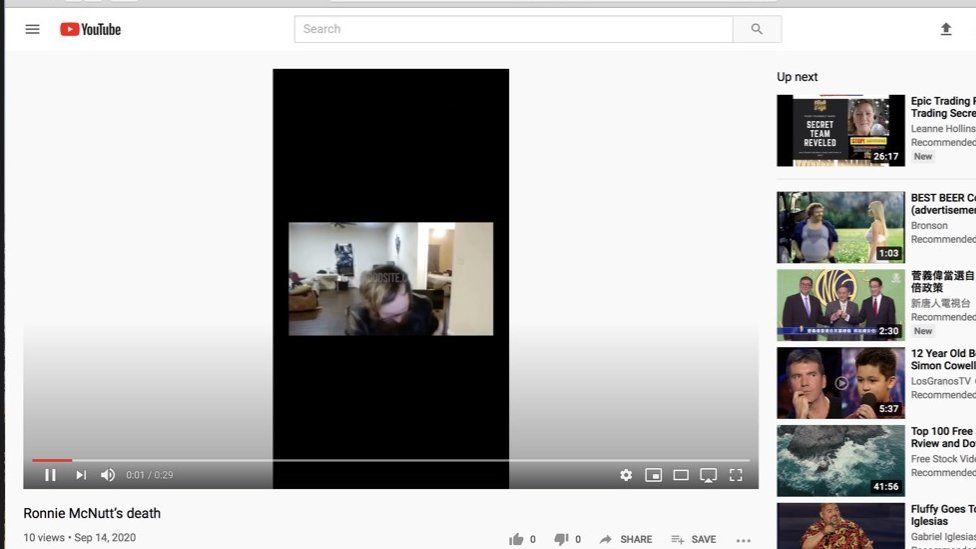Understanding The Tragic Event Of Ronnie McNutt's Suicide And Its Lasting Impact
The internet, for all its connections and information, also holds moments of profound sadness. One such moment, a rather distressing one, involved the live-streamed suicide of Ronnie McNutt. This event, which happened on December 2, 2020, sent shockwaves across many online platforms. It really brought to light the serious challenges of content moderation and the deep effects graphic material can have on people who see it. For many, it's a stark reminder of how quickly distressing content can spread, and the real need for better online safety measures.
This particular incident, you know, it became a really difficult topic. People were talking about it, and a lot of the discussion focused on how such a private, tragic moment could become so widely shared. It just showed, in a way, the sheer power and the potential downsides of live streaming. The situation also made us think about the responsibility platforms have, and actually, what our own responsibility is as internet users, when something so sensitive goes viral.
So, this article aims to gently explore the context around Ronnie McNutt's suicide, and it will discuss the wide-reaching impact it had, especially on young viewers. We also want to highlight the vital importance of mental health awareness and the support systems that are out there. It's a tough subject, yes, but it’s really important to talk about it openly, to help prevent similar tragedies and to support those who might be struggling, or who have seen something upsetting online, you know?
Table of Contents
- Ronnie McNutt: A Brief Personal Look
- The Event and Its Unfortunate Spread
- The Psychological Toll on Viewers
- Online Content Moderation and Platform Responsibility
- Seeking Help and Offering Support
- Frequently Asked Questions about Ronnie McNutt Suicide
Ronnie McNutt: A Brief Personal Look
Ronnie McNutt, you know, was a U.S. Army veteran from Mississippi. He had served in Iraq, and then, after his service, he had been working at a Toyota factory. His life, like many, had its challenges. He had reportedly been struggling with his mental health, and that's a situation many people can relate to, in some way. It's really tough when someone faces those kinds of personal battles, and it just shows how much support people need, actually.
His story, tragically, became public in a way no one would ever want. It highlights the very personal struggles many individuals face, often unseen. This event, in particular, brought a lot of attention to the silent battles some veterans fight, and the importance of looking out for those around us. It's a sobering thought, really, about how much we sometimes miss in the lives of people we know.
Personal Details
| Detail | Information |
|---|---|
| Name | Ronnie McNutt |
| Military Service | U.S. Army veteran (served in Iraq) |
| Age | 33 (at time of death) |
| Location | New Albany, Mississippi |
| Reported Struggles | Mental health issues, relationship problems |
The Event and Its Unfortunate Spread
The tragic event itself, you see, was live-streamed on Facebook. This was on December 2, 2020. What made it even more distressing was how quickly the video then spread to other platforms, like TikTok and YouTube. It was almost impossible, for a while, to escape seeing it. People were just sharing it, and it really caught many off guard, you know?
Despite efforts from platforms to remove the content, it kept reappearing. Users would re-upload it, sometimes embedding it into seemingly innocent videos or even cutting it into clips. This made it really difficult for content moderators to keep up. It just showed how determined some people were to share it, and the sheer volume of content platforms have to deal with, basically.
This rapid spread, you might say, highlighted a significant problem with how graphic content can bypass safety filters. It really exposed the vulnerabilities in our online ecosystems. The incident became a prime example of the challenges platforms face in controlling harmful material, and it made many people question how safe online spaces truly are for everyone, especially for younger users, in a way.
The Psychological Toll on Viewers
Seeing such a graphic video, you know, can have really serious effects on people's mental health. Many viewers, especially children and teenagers, reported feeling deeply distressed, anxious, and even traumatized after seeing the footage. It's just not something anyone should have to witness, really. The images, for some, were very hard to shake off.
The unexpected nature of how the video appeared, often disguised within other content, made it even worse. People were just scrolling through their feeds, expecting normal videos, and then suddenly, they saw something truly horrific. This kind of exposure, so it's said, can lead to long-term psychological issues, including nightmares, intrusive thoughts, and a general feeling of unease about being online. It really shows the need for caution, actually.
For parents and guardians, this incident sparked a lot of concern about protecting young people online. It made many realize that simply monitoring screen time might not be enough. There's a real need, you see, for open conversations with kids about what they might encounter online and how to handle upsetting content. It's about building resilience, and also knowing when to seek help, you know?
Online Content Moderation and Platform Responsibility
The Ronnie McNutt incident, you might say, put a huge spotlight on the responsibility of social media companies. There was a lot of criticism about how long it took to remove the video and how easily it was re-uploaded. People were asking, quite rightly, why these platforms weren't doing more to protect their users. It's a big question, in a way, for these huge companies.
Platforms like TikTok and Facebook, so it goes, faced immense pressure to improve their moderation systems. This involved using a mix of artificial intelligence and human moderators to identify and remove harmful content more quickly. But it's a constant battle, basically, because new content is uploaded every second. It's a bit like trying to catch water with a sieve, almost.
This event, you know, also brought up discussions about proactive measures, not just reactive ones. How can platforms prevent such content from going live in the first place? It's a really complex issue, balancing free speech with user safety. The debate continues, actually, about what the right balance is, and how much power these companies should have over what we see. It’s a very important conversation for our digital age, in some respects.
Seeking Help and Offering Support
If you or someone you know has seen distressing content, or if you're struggling with mental health issues, it's really important to remember that help is available. You don't have to go through it alone, you know? Talking to someone, a friend, a family member, or a professional, can make a huge difference. There are people who want to listen and support you, actually.
For those who have been affected by graphic online content, it's okay to feel upset. Give yourself permission to process what you've seen. Try to limit further exposure to similar content, and consider taking a break from social media. Engaging in activities that bring you comfort and joy can also help. It's just about being kind to yourself, really, during a difficult time.
If you're worried about a friend or family member, reach out to them. A simple check-in can mean a lot. Encourage them to talk, and listen without judgment. Sometimes, just knowing someone cares is a huge step. Remember, you can Learn more about mental well-being on our site, and link to this page for immediate help if you need to find resources. There are many organizations dedicated to providing support, and they are ready to assist. It's a good thing to remember, that.
It's also worth noting, you know, that the name "Ronnie" appears in many different contexts online. For example, some information available, perhaps from a quick search, might point to sports news websites like ronnie.cz, which covers various events and results, including bodybuilder Michal Križánek's achievements or local running races in the Czech Republic. That's a very different kind of content, obviously, and it just shows how names can crop up in all sorts of places on the internet, which is vast, in a way.
Understanding the impact of events like Ronnie McNutt's suicide means also understanding the broader landscape of mental health. It's a continuous conversation, you might say, about creating a more compassionate and safe online environment for everyone. This involves not only platform responsibility but also individual choices about what we consume and share. It’s a collective effort, really, to make the internet a better place for our well-being.
Frequently Asked Questions about Ronnie McNutt Suicide
What happened to Ronnie McNutt?
Ronnie McNutt, a U.S. Army veteran, tragically died by suicide on December 2, 2020. The event was live-streamed on Facebook, and the video then spread widely across various social media platforms, causing significant distress to many viewers, especially young people. It was a very difficult situation, actually, for a lot of people to witness.
Why did the Ronnie McNutt video spread so widely?
The video spread very quickly because users re-uploaded it to platforms like TikTok and YouTube, often disguising it within other content. This made it really hard for content moderation systems to catch and remove it promptly. It just kept popping up, in a way, which was very upsetting for many online users.
What should I do if I or someone I know has seen the video or is struggling with mental health?
If you have seen the video and feel distressed, or if you are struggling with mental health, it is very important to seek help. You can talk to a trusted friend, family member, or a mental health professional. Organizations like the National Suicide Prevention Lifeline (available by calling or texting 988 in the U.S. and Canada, or by calling 111 in the UK for NHS services) offer immediate support. You are not alone, you know?
For immediate support, you can contact the National Suicide Prevention Lifeline by calling or texting 988 in the U.S. and Canada, or by calling 111 in the UK for NHS services. These services are there to help, really.

Friend challenges Facebook over Ronnie McNutt suicide video - BBC News

Ronnie McNutt suicide video uploaded to TikTok, Facebook can’t be

Friend challenges Facebook over Ronnie McNutt suicide video - BBC News